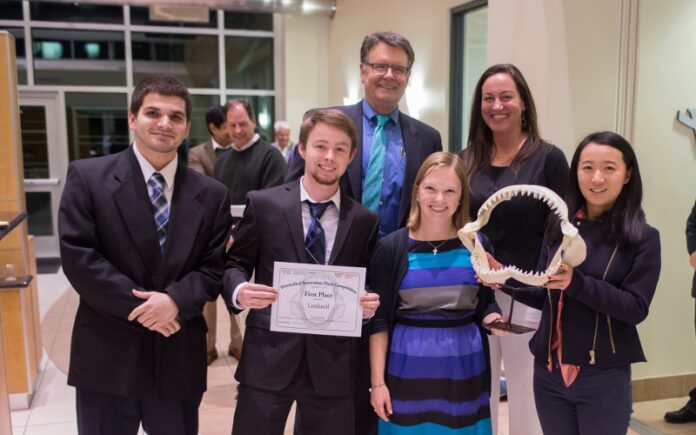
Teams of students from engineering, business, and the Translational Biology, Medicine, and Health (TBMH) graduate program at Virginia Tech dove headlong into a biomedical “shark tank” at the Virginia Tech Carilion Research Institute last week, working together to turn great ideas into real-world solutions and products.
In an exercise to simulate the commercialization of products in the biomedical and health sciences spaces, graduate and undergraduate students pitched ideas collected from university Intellectual Property offices.
“Each team is assigned intellectual property and builds a business pitch around it,” said Rob Gourdie, a professor at the VTCRI who oversaw the pitching event along with Mark Van Dyke, an associate professor in the Department of Biomedical Engineering and Mechanics (BEAM) in the College of Engineering; and Derick Maggard, executive director of the APEX Systems Center for Innovation and Entrepreneurship in the Pamplin College of Business.
For students, there was an adjustment period:
“I had to become familiar with lot of the terms business people use regularly — especially terms entrepreneurs will be interested in when they are investing in a company,” said TBMH student with Ivan Zuidhoek from Roanoke, Virginia.
“The learning curve for this project is very steep,” said Patrick St. Pierre, a business student from Arlington, Virginia. “It was a lot to get done in a limited time, but it was really exciting and I always look forward to a challenge like this.”
“I am more focused on trying to make a product that actually works, while others may be more focused on making a product that not only works, but one they gain a profit from in the marketplace,” said Maria Solares, a TBMH student from Guatemala.
“It was apparent while we were working within these collaborative teams that we all were from different backgrounds. It comes together well on a project that has engineering and science, but you need a business side of it as well,” said Sabah Rezvani, a biomedical engineering student from Los Altos, California.
The two-week commercialization module was built into the Translational Biology, Medicine, and Health Graduate Program’s gateway class, led by Michael Friedlander, executive director of the Virginia Tech Carilion Research Institute, vice president for health sciences and technology at Virginia Tech, and one of the judges of the competition.
Instructors said the students made progress in a very rapid time.
“You can really see the peer learning going on, which was part of what we were trying to accomplish,” Van Dyke said. “They recognize that they have different strengths and weaknesses and it is definitely cool to see that they are really learning from each other.”
“The students really make this happen,” Maggard said. “They have seen intense intellectual property that they were able to take from an idea, all the way to the opportunity to commercialize it. And that’s what we want to do at Virginia Tech — take innovations and turn them into new startup companies.”
In addition to Friedlander, the Biomedical Innovation Pitch Competition was judged by Gautam Ghatnekar, a co-founder of the biotech company FirstString Research; Nanci Hardwick, chief executive officer of Aeroprobe Corp.; Victor Ianello, chief executive officer of Radiant Physics; Robert McAden, chair of the Roanoke Blacksburg Technology Council; Mary Miller, director of the Regional Acceleration and Mentoring Program (RAMP), and James Ramey, principal and fund manager at Middleland Capital and the VTC Innovation Fund.
Prize money of $7,000 was awarded, with sponsorship coming from Woods Rogers, Pinnacle Bank, FirstString Research, VTCRI and Apex Systems Center. Other local business leaders who mentored teams included Greg Feldmann, president of Skyline Capital Strategies; Sam English, CEO of Attention Point; Kevin Bloomfield of Bloomfield Partners, and Anne Brown, co-founder of DESA and a data and informatics consultant with University Libraries.


